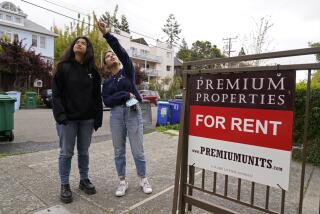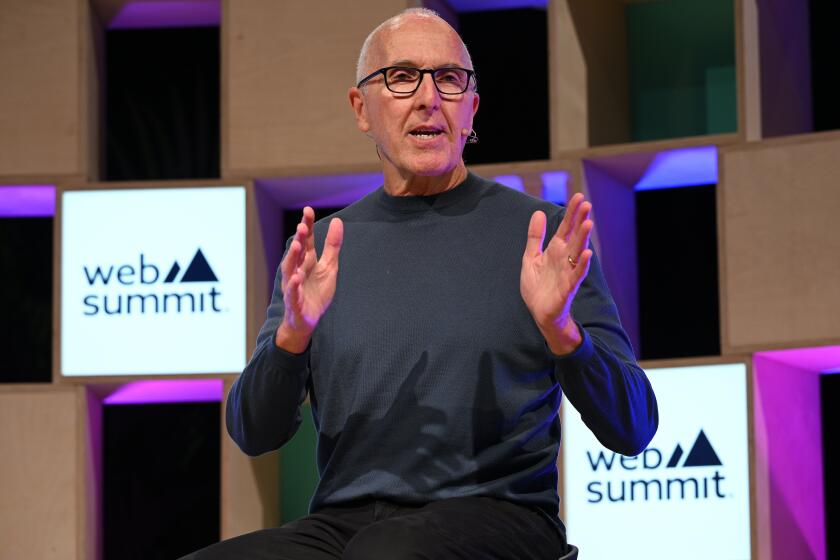U.S. Economy on ‘Firm Footing’
Federal Reserve Chairman Alan Greenspan on Wednesday reaffirmed what a growing body of data has made clear: Last spring’s soft patch is long gone as the economy has picked up steam.
The Fed chief told the House Financial Services Committee that despite high energy costs and other concerns, economic growth was on a “firm footing” while inflation remained in check. But the central bank will continue to raise short-term interest rates to keep things that way, he said.
“Our baseline outlook for the U.S. economy is one of sustained economic growth and contained inflation pressures,” Greenspan, 79, told the committee in one of his last appearances before Congress as Federal Reserve chairman. Indeed, recent economic reports have shown that consumer spending is resilient, despite high gasoline prices. Business spending is picking up. Manufacturing is rebounding. Corporate profits continue to beat expectations. But inflation remains relatively tame, and although job creation is gaining momentum, there still is slack in the labor market with many people out of the workforce.
Such conditions, some analysts say, are reenacting the “Goldilocks” economy of the late 1990s -- not too hot, not too cold. That perception has been a key catalyst behind the stock market’s rally in recent weeks, analysts say.
But to sustain economic growth and contain inflation, Greenspan said, the central bank must “continue to remove monetary accommodation” -- Fed-speak for raising interest rates to a neutral level that retards inflation and economic growth.
Greenspan and many economists are concerned about two key inflation bugaboos: rising labor costs and energy prices. Although rising wages are great for workers, it’s not so great if you’re the nation’s No. 1 inflation fighter.
A solidly growing economy will simply push wages higher, forcing businesses to raise prices, said Ken Goldstein, an economist at the Conference Board, a business research organization in New York.
Average hourly wages rose 2.7% on an annualized basis in June, up from around 2% in January 2004, but will reach 4% by the end of next year or early 2007, Goldstein said.
“For employers to get good talent, they are going to have to pay for it,” he said. Because of that, “inflation is going to edge higher, therefore short-term interest rates must go higher.”
Indeed, the Fed revealed Wednesday that it raised its forecast for inflation. The central bank now expects a key inflation gauge -- which excludes food and energy costs -- to rise to 1.75% to 2% this year, up from the previous forecast, made in February, of 1.5% to 1.75%. That measure stood at 2% in the first quarter.
The Fed also cut its forecast for economic growth to 3.5% this year, down from the previous estimate of 3.75% to 4%. The economy grew at a 3.8% rate in this year’s first quarter.
Greenspan on Wednesday also reiterated his concern about low long-term interest rates, which have stayed down despite the Fed’s hikes in short-term rates. That situation, which Greenspan has called a “conundrum,” has depressed mortgage rates, helping to create what Greenspan called “froth” in the housing market.
The unexpected decline in mortgage and other long-term rates “has stimulated activity even as the Fed has hiked short rates. Result -- short rates have to keep rising,” said Ian Shepherdson, chief U.S. economist for High Frequency Economics in Valhalla, N.Y.
The Fed’s benchmark federal funds rate now stands at 3.25%, up from a generational low of 1% in June 2004. Many economists and investors expect that rate to hit 4% by year-end, meaning that the Fed will apply quarter-point hikes at three of its four remaining meetings this year. Its next rate-setting gathering is Aug. 9.
Greenspan will appear today before the Senate Banking Committee in his last scheduled semiannual congressional testimony before his Fed term ends in January.
Rep. Brad Sherman (D-Sherman Oaks) told Greenspan that he was introducing legislation to exempt the Fed chief from the legal requirement that he must leave the central bank when his current term expires. Sherman told the House panel that Greenspan deserves another five years for his good work.
“Does my wife have a vote on this?” Greenspan asked jokingly.






